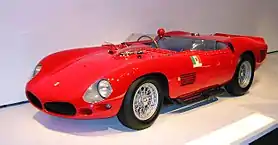Scuderia Serenissima
Scuderia Serenissima or Scuderia SSS Republica di Venezia was an auto racing team funded by Giovanni Volpi and active in the early 1960s. The name "Serenissima" ("Most Serene") refers to one of the many definitions the city of Venice is known for, the Volpi family being originally from the area. Based in Sasso Marconi, close to Bologna, Serenissima mostly competed in Formula One and sports car racing. Originally the team had an engine supply agreement with Ferrari. When Volpi decided to financially support ATS, a Formula One team put together by Carlo Chiti, Giotto Bizzarrini, Romolo Tavoni and other breakaway Ferrari employees, Enzo Ferrari withdrew from the agreement. Serenissima subsequently turned to De Tomaso and Maserati without much success. Serenissima officially closed in 1970.
 | |
| Full name | Scuderia Serenissima Scuderia SSS Republica di Venezia |
|---|---|
| Base | Italy |
| Founder(s) | Giovanni Volpi |
| Noted drivers | |
| Formula One World Championship career | |
| First entry | 1961 Monaco Grand Prix |
| Races entered | 8 [1][2] |
| Drivers' Championships | 0 |
| Race victories | 0 |
| Pole positions | 0 |
| Fastest laps | 0 |
| Final entry | 1962 Italian Grand Prix |

Formula One
Scuderia Serenissima made its debut in the 1961 Formula One World Championship. The team first entered a Cooper T51 for Maurice Trintignant at the 1961 Monaco Grand Prix, where he finished seventh. In Belgium, Trintignant retired after 23 laps with a broken gearbox after having qualified his car in 19th place. At the 1961 French Grand Prix, Scuderia Serenissima entered two cars – a Cooper for Trintignant and a De Tomaso for Giorgio Scarlatti. Trintignant finished in 13th place while Scarlatti retired on lap 15 when his engine broke down. At the German Grand Prix Trintignant retired on lap 12 when his engine broke down. In the 1961 Italian Grand Prix, the team again entered two cars, the Cooper for Trintignant and the De Tomaso for Nino Vaccarella. Trintignant finished the race in ninth place and Vaccarella retired on lap 13 when a failed engine.
For the following season, the team, now called Scuderia SSS Republica di Venezia, entered a car for Nino Vaccarella. In Monaco, Vaccarella failed to qualify for the race. Three races later in Germany, Vaccarella finished in 15th place. The last Formula One race for the team was at Monza in Italy, where Vaccarella finished in 9th place.
Serenissima resurfaced in 1966 as engine supplier for McLaren. At the 1966 British Grand Prix Bruce McLaren finished in sixth place, scoring one World Championship point.
Sports car racing
Serenissima entered the 1962 24 Hours of Le Mans with two Ferrari 250, one driven by Joakim Bonnier and Dan Gurney, and one by Carlo Maria Abate and Colin Davis. Both cars retired after 4 hours with gearbox problems. In the same year, the team won the Sebring 12 Hours with Bonnier and Lucien Bianchi. In 1963, Volpi began developing his own prototype GT car, the Jungla GT. It used a new V8 engine, designed by Alberto Massimino, with closed bodywork by Francesco Salomone (built by Gran Sport). A later open version was built by Medardo Fantuzzi. In 1966 Serenissima joined forces with Luigi Chinetti's North American Racing Team and fielded one car at the 24 Hours of Le Mans driven by Vaccarella and Mario Casoni. The car retired after three hours with a water leak. A second car driven by gentleman driver Louis Corbero failed to qualify. In 1968, Volpi got interested in the idea of building a proper GT car with the help of Alejandro de Tomaso's Ghia Studios. The Ghia coupe, designed by Tom Tjaarda and Giorgetto Giugiaro, was originally fitted with a Massimino 3.5-litre V8 engine but later switched to a 3.0L Alf Francis M176 V8. At the 2019 Retromobile Show the car was auctioned for $504,053.[3]
Complete Formula One World Championship results
As a constructor
(key)
| Year | Chassis | Engine | Tyres | Driver/s | 1 | 2 | 3 | 4 | 5 | 6 | 7 | 8 | 9 |
|---|---|---|---|---|---|---|---|---|---|---|---|---|---|
| 1961 | Cooper T51 De Tomaso F1 |
Maserati 6-1500 1.5 L4 OSCA 372 1.5 L4 Alfa Romeo Giulietta 1.5 L4 |
D | MON | NED | BEL | FRA | GBR | GER | ITA | USA | ||
| 7 | Ret | 13 | Ret | 9 | |||||||||
| Ret | |||||||||||||
| Ret | |||||||||||||
| 1962 | Lotus 18/21 24 Porsche 718 |
Climax FPF 1.5 L4 Porsche 547/3 1.5 F4 |
D | NED | MON | BEL | FRA | GBR | GER | ITA | USA | RSA | |
| DNQ | 15 | 9 | |||||||||||
Source:[4] | |||||||||||||
Bibliography
- Michael John Lazzari - Giovanni Faoro. Scuderia Serenissima, Cove Edition, 2018, ISBN 978-88-940667-1-5
References
- "Scuderia Serenissima results at chicanef1.com". Formula One Results. Retrieved 31 January 2012.
- "Scuderia SSS Republica di Venezia results at chicanef1.com". Formula One Results. Retrieved 31 January 2012.
- https://www.carsceneinternational.com/scudia-serenissima/
- Small, Steve (1994). The Guinness Complete Grand Prix Who's Who. Guinness. pp. 334, 384 and 386. ISBN 0851127029.
- Small, Steve (1994). The Guinness Complete Grand Prix Who's Who. Guinness. p. 236. ISBN 0851127029.